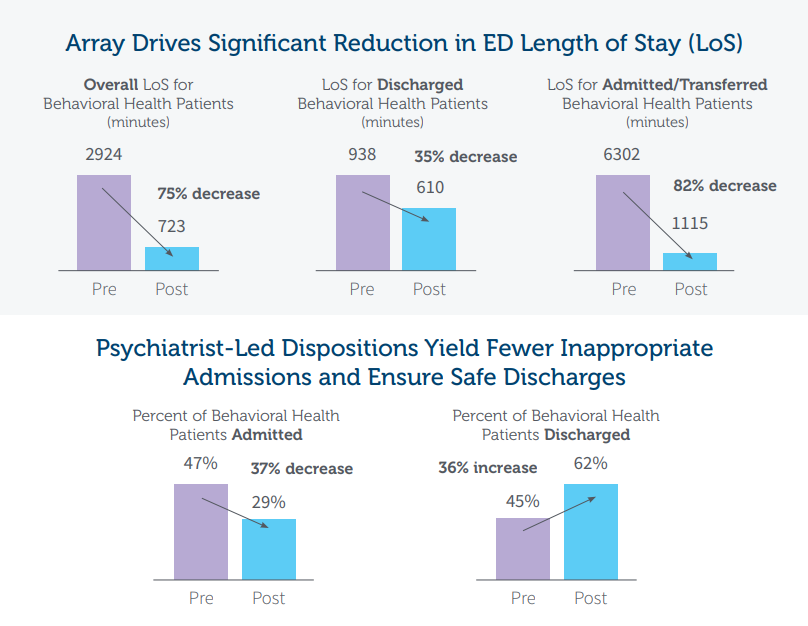Challenges
Limited access to psychiatrists for risk assessment and care leads to long wait times and treatment delays for behavioral health patients in the ED. It also contributes to defensive or inappropriate admissions for some patients, who could be safely discharged to a lower level of care. Further, these patients rarely receive stabilizing medication or psychotherapy to advance their care while awaiting inpatient placement, leading to worsening symptoms and poor outcomes.
This case study explores how two hospitals within a larger regional healthcare system in the southeast took proactive steps to address these issues and improve the efficiency and quality of behavioral health care in their emergency departments.
Solution
Hospital leaders partnered with Array to develop a comprehensive behavioral health strategy to enhance access to timely and appropriate care, optimize operational efficiencies and resource utilization, and improve patient risk identification and management.
Together, these clinical and operational experts designed a custom solution with standard treatment protocols and streamlined workflows to ensure the delivery of safe, effective, high quality behavioral health care. They also established a coverage plan based on the hospitals’ historical and forecasted demand, patient presentation data, and staffing and resource constraints to ensure sufficient availability during periods of high volume.
Array’s behavioral health solution for these hospitals includes:
- Psychiatrist-led risk assessment and level-of-care determination
- Evidence-based behavioral health interventions, including the initiation of stabilizing treatment as needed
- Daily reassessment of patients awaiting inpatient placement to advance their care and determine if their condition has improved, and they are safe to discharge
- Proactive safety planning that considers behavioral health resources available in the surrounding community
- Collaboration with onsite care coordinators for informed disposition decisions and smooth care transitions
Array Behavioral Care provides acute psychiatric care services to these EDs through its OnDemand model, which is designed to improve clinical outcomes for patients and operational efficiency for hospital partners. Through this model, these hospitals benefit from timely access to a team of psychiatrists for psychiatric assessment, care, and risk-informed disposition recommendations. These Array clinicians are available to evaluate patients upon request, collaborate with onsite resources, and provide guidance in treatment decisions so that patients can move to the appropriate next level of care quickly.
This program has greatly improved patient outcomes and streamlined care processes in the ED for both hospitals, as shown by the data below showing notable reductions in length of stay and unnecessary admissions. Hospital leaders and providers appreciate that this program allows them to identify and manage low-risk patients more efficiently and treat higher-risk patients more effectively.
Array maintained 99% SLA compliance and consistently outperformed contracted response times:


